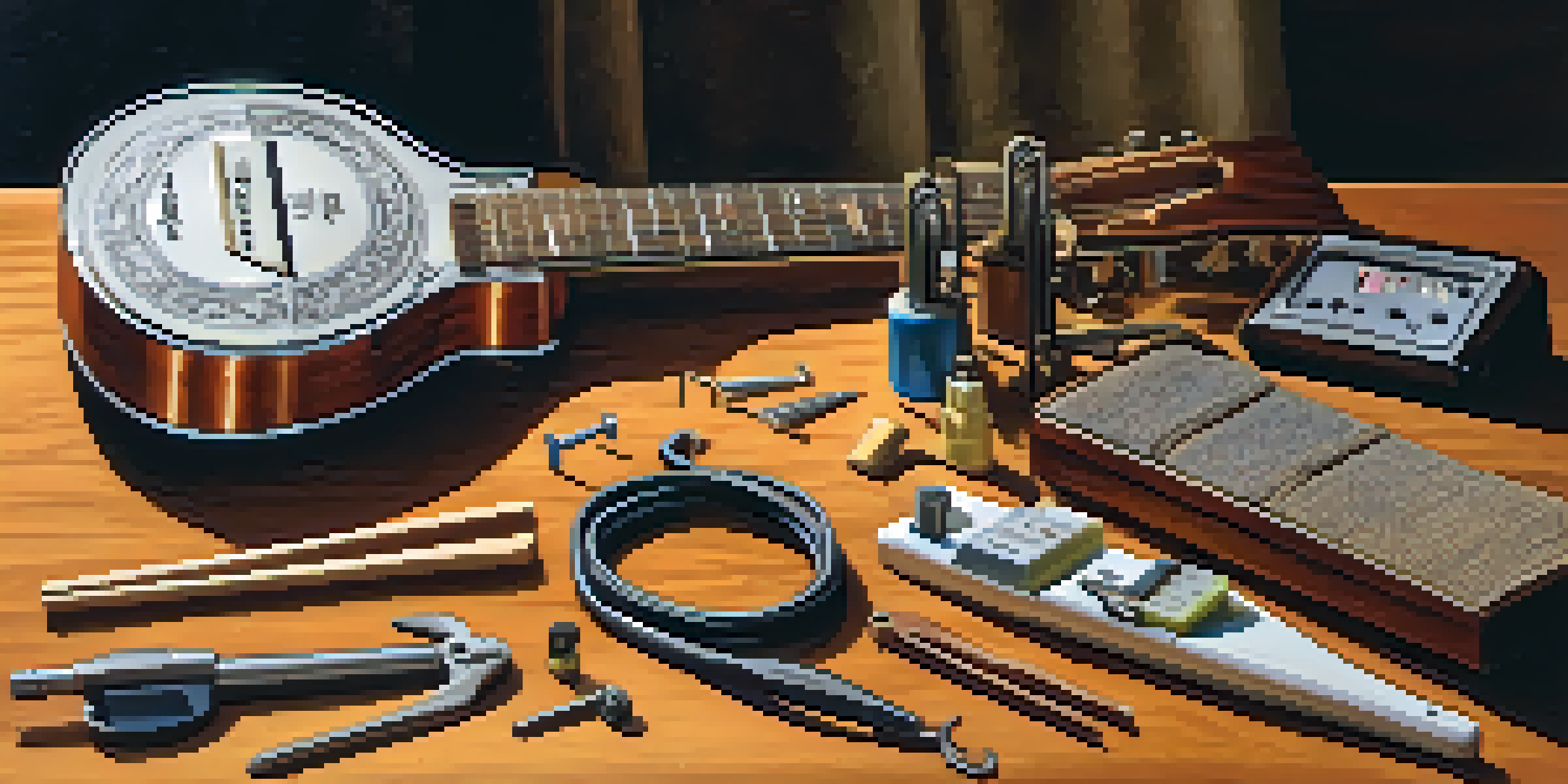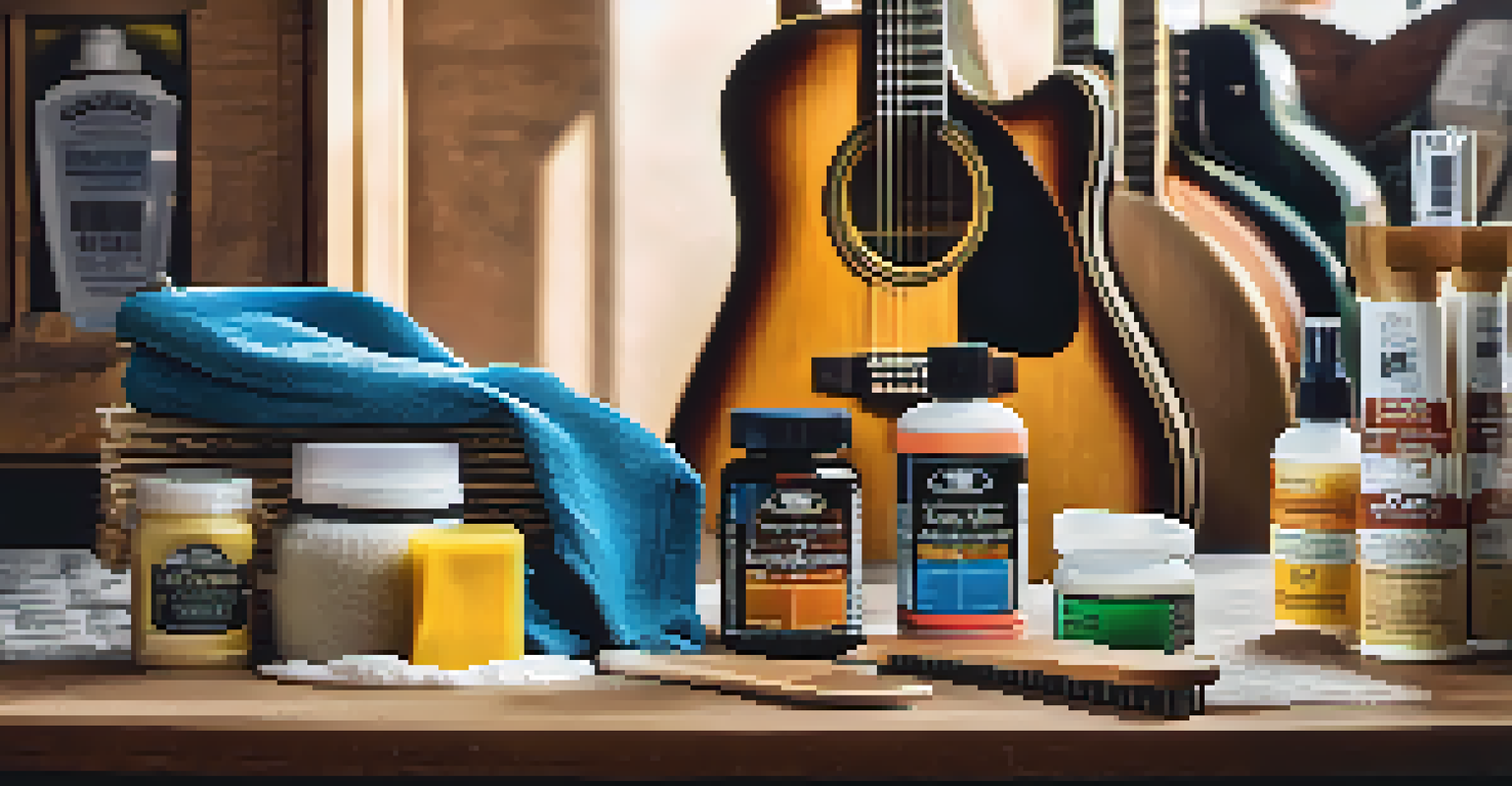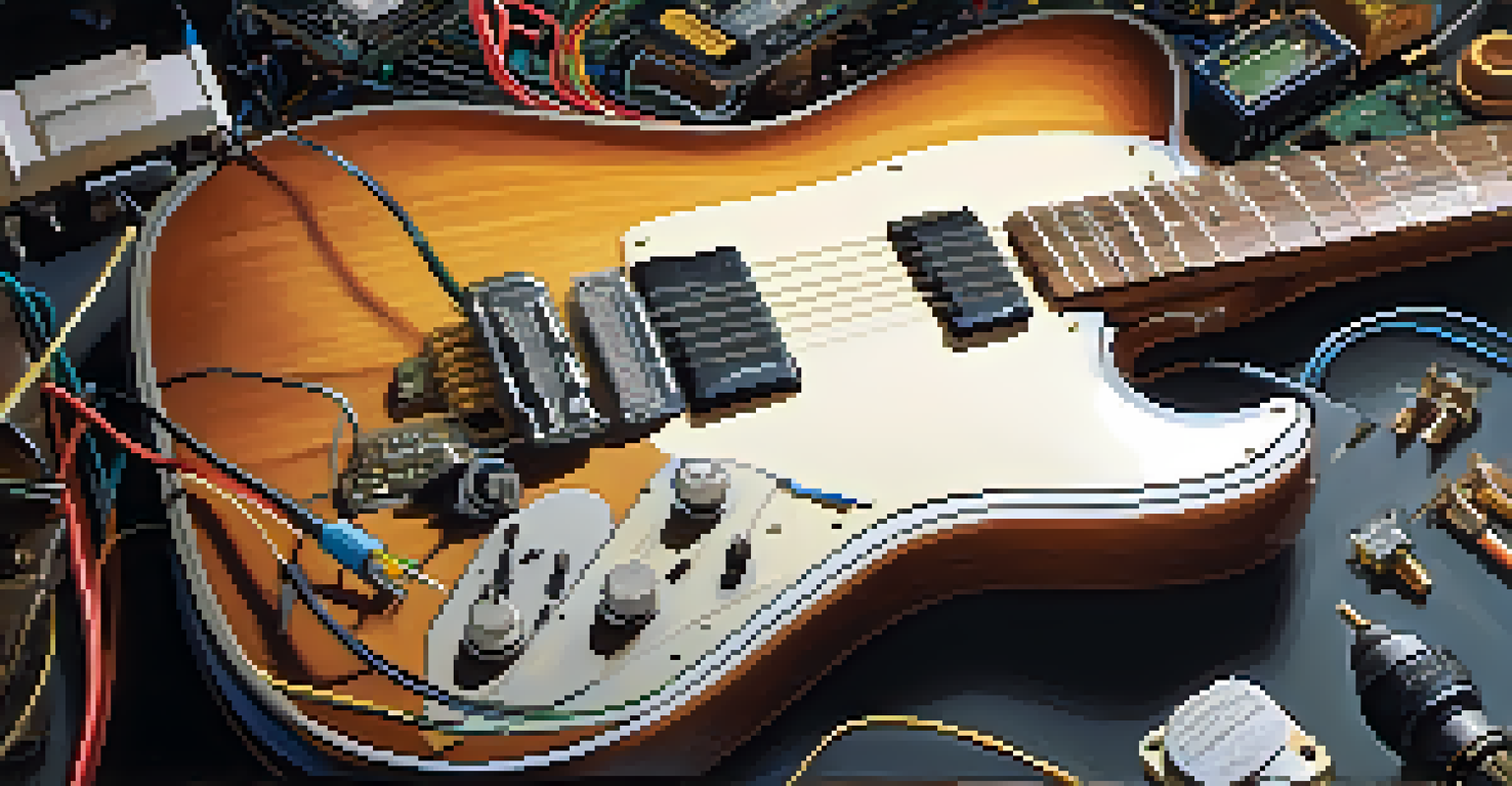The Best Tools for Guitar Maintenance: A Complete Guide

Essential Tools for Guitar String Changes and Maintenance
Changing strings is a fundamental part of guitar maintenance, and having the right tools makes the job easier. A string winder speeds up the process, allowing you to quickly remove old strings and put on new ones without straining your fingers. Additionally, a wire cutter is essential for trimming excess string length, ensuring a clean finish after you've secured your new strings.
Every guitar player should know how to maintain their instrument. The more you take care of it, the better it will sound and the longer it will last.
Don’t forget a tuner! Keeping your guitar in tune is crucial for maintaining sound quality, and a clip-on tuner helps you quickly check and adjust your pitch. This is especially useful for beginners who are still developing their ear for music. By regularly changing strings and tuning your guitar, you’ll be able to enjoy a richer, more vibrant sound.
Finally, consider investing in a neck relief gauge. This tool measures the bow in the neck, allowing you to make precise adjustments to the truss rod. Proper neck relief is vital for optimal playability and avoiding buzzing sounds. With these tools, you'll ensure your guitar is always ready to deliver great music.
Cleaning Tools to Keep Your Guitar Looking Great
Maintaining the appearance of your guitar is just as important as keeping it in tune. A soft microfiber cloth is perfect for wiping down the body and neck after playing, removing sweat and fingerprints without scratching the finish. Regular cleaning not only keeps your guitar looking pristine but also prevents build-up that can affect performance.

For deeper cleans, a guitar-specific cleaner is worth considering. These cleaners are designed to safely remove grime and dirt without harming the finish, ensuring your instrument stays in top shape. Just remember to use these products sparingly and always follow the manufacturer's instructions to avoid any mishaps.
Essential Tools for String Changes
Having tools like a string winder, tuner, and neck relief gauge makes changing guitar strings efficient and ensures optimal playability.
Don't overlook the fretboard! A fretboard conditioner can rejuvenate the wood, especially if you play frequently. Applying the conditioner helps prevent cracking and drying out, extending the life of your guitar. With the right cleaning tools, your guitar will not only sound amazing but also look as good as new.
Tools for Adjusting Action and Intonation on Your Guitar
Proper action and intonation are crucial for a great playing experience. An action gauge allows you to measure the height of your strings from the fretboard, helping you make necessary adjustments for comfort and playability. This tool is especially helpful for players who perform different styles, as they might prefer varying string heights.
A guitar is not just an instrument; it is an extension of yourself. Keeping it in top shape is essential to expressing your true sound.
Intonation affects how well your guitar stays in tune across the fretboard. A tuner and a screwdriver are the key tools here. You’ll use the tuner to check the pitch of each string when played open and at the 12th fret, while the screwdriver can adjust the bridge saddles to ensure accurate intonation. Properly set intonation prevents frustrating tuning issues during performances.
Finally, consider using a capo as a versatile tool for checking action and intonation in different positions. By placing a capo on different frets, you can test playability and make adjustments as needed. This way, you’ll ensure that your guitar is set up perfectly for every style of play.
Essential Tools for Guitar Setup and Maintenance
A complete guitar setup involves several adjustments to optimize performance. A ruler or string action gauge is essential for measuring string height accurately. This ensures that your guitar feels comfortable to play while maintaining a low action to prevent buzzing.
A truss rod wrench is another must-have tool for adjusting neck relief. This adjustment helps counteract the natural curvature of the neck, which can change due to humidity and temperature. By ensuring the neck is straight, you enhance playability and reduce the risk of fret buzz.
Keeping Your Guitar Clean and Pristine
Regular cleaning with a microfiber cloth and guitar-specific cleaners helps maintain your instrument's appearance and performance.
Finally, don't forget about a set of allen wrenches for adjusting pickup height. The distance between the pickups and strings impacts both volume and tone. With these setup tools, you’ll be able to customize your guitar to fit your playing style perfectly.
Choosing the Right Guitar Case for Storage and Transport
Protecting your guitar is essential, especially if you travel or store it for long periods. Choosing the right case can make all the difference. Hard cases provide maximum protection against drops and bumps, while soft cases, or gig bags, offer lightweight options for easy transport. Consider your lifestyle and choose a case that suits your needs.
Additionally, think about the climate. If you live in an area with extreme temperatures or humidity, a case with built-in humidity control is ideal. This feature helps maintain the wood's integrity and prevents warping or cracking, which can severely affect your guitar’s sound quality.
Lastly, always keep your guitar in its case when not in use. This simple habit can prevent accidental damage and keep dust away. A well-chosen case not only protects your instrument but also prolongs its lifespan, allowing you to enjoy it for years to come.
Tools for Guitar Electronics Maintenance and Repair
Electronics are often the unsung heroes of a guitar's sound. A soldering iron is essential for any repairs or modifications to pickups or wiring. If you notice a volume drop or crackling sound, it might be time for a little TLC on the electronic side. Learning basic soldering skills can save you time and money on repairs.
A multimeter is another handy tool for troubleshooting. This device helps you measure voltage, resistance, and continuity in your guitar’s wiring. With a multimeter, you can identify issues like faulty connections or broken wires, ensuring your guitar’s electronics function smoothly.
Importance of Proper Guitar Setup
Using tools like a ruler, truss rod wrench, and allen wrenches allows for precise adjustments that enhance playability and sound quality.
Lastly, keep some spare parts on hand, like capacitors and pots. These components can wear out over time, leading to a decline in sound quality. By having these spare parts ready, you’ll be well-equipped to maintain your guitar’s electronics and keep your sound consistent.
Recommended Brands for Quality Guitar Maintenance Tools
When it comes to choosing maintenance tools, brand quality can significantly impact performance. For string winders and cutters, brands like Dunlop and Ernie Ball are highly regarded for their durability and effectiveness. Investing in quality tools will ensure they last through countless string changes.
For cleaning supplies, consider products from MusicNomad or Guitar Clean, which are praised for their effectiveness and safe ingredients. These brands prioritize the care of your instrument, giving you peace of mind while maintaining that polished look.

Lastly, for setup tools, brands like StewMac offer comprehensive kits that include everything from action gauges to truss rod wrenches. Their tools are designed with guitarists in mind, ensuring precision and ease of use. When you choose trusted brands, you're investing in your guitar's longevity and performance.
Tips for Maintaining Your Guitar Between Professional Setups
Regular maintenance will extend the life of your guitar and enhance playability. One of the simplest tips is to wipe down your strings after every session. This practice reduces corrosion and keeps your strings sounding brighter for longer, which is especially beneficial for those who play frequently.
Store your guitar in a stable environment. Extreme temperatures and humidity can lead to warping and other issues. If possible, keep your guitar in its case when not in use and consider using a hygrometer to monitor humidity levels in your storage area.
Lastly, don’t hesitate to learn basic maintenance skills. Understanding how to change strings, clean, and make minor adjustments can save you money and keep your guitar in top shape. With these tips, you’ll maintain a fantastic playing experience and ensure your guitar stays beautiful and functional.